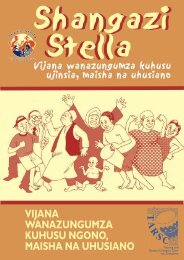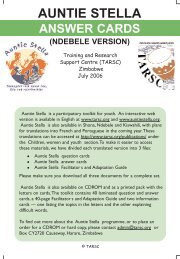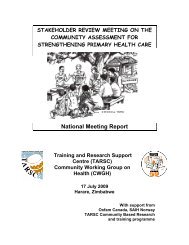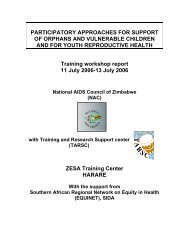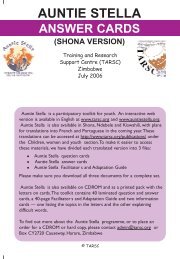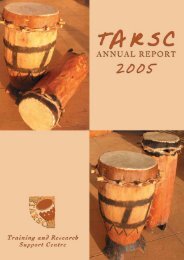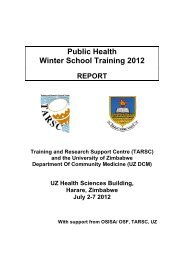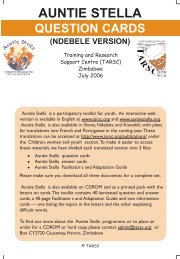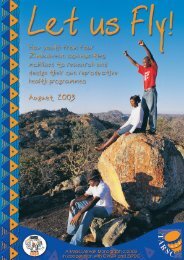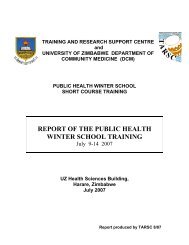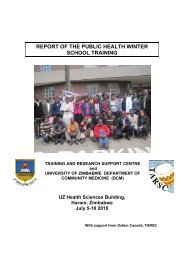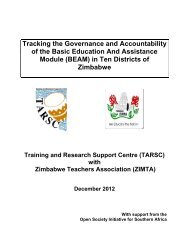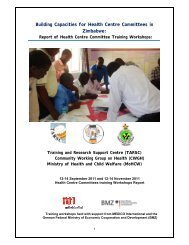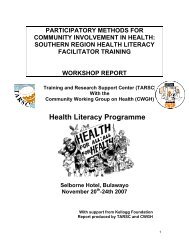HLregional meeting09.pdf - Training and Research Support Centre
HLregional meeting09.pdf - Training and Research Support Centre
HLregional meeting09.pdf - Training and Research Support Centre
Create successful ePaper yourself
Turn your PDF publications into a flip-book with our unique Google optimized e-Paper software.
1. Organizational assessment: Starting from the EQUINET network identifying organizations<br />
that are national, operate at community level <strong>and</strong> take issues from the bottom for advocacy<br />
to influence policy <strong>and</strong> practice<br />
2. Needs <strong>and</strong> capacity assessment: to determine the content of the Health Literacy materials<br />
based on the needs of the people in each country<br />
3. Development of Regional core materials: core regional material that is st<strong>and</strong>ard (done at<br />
TARSC) that define the overall spine <strong>and</strong> core of the HL work<br />
4. Development of National materials: development of country specific materials based on<br />
the needs <strong>and</strong> capacity assessment done by implementing country partner <strong>and</strong> TARSC<br />
5. Pilot in two districts (one rural <strong>and</strong> one urban): testing the draft materials with the target<br />
audience <strong>and</strong> getting their input, comments <strong>and</strong> additions to strengthen materials<br />
6. Peer review: by a technical country group identified collectively by implementing country<br />
partner <strong>and</strong> TARSC to peer review the materials from a technical side<br />
7. Revision of materials: consolidating the inputs <strong>and</strong> comments from the district pretest <strong>and</strong><br />
the peer reviewers into final materials<br />
8. Facilitator training: facilitators are chosen on the basis on their ability to read <strong>and</strong> write in<br />
English since the materials are still in English, underst<strong>and</strong> community health <strong>and</strong> have been<br />
involved in community health, use of PRA tools is an added advantage, good<br />
communication <strong>and</strong> organizing skills, already working on other community health work is<br />
also an added advantage<br />
9. Evaluation <strong>and</strong> follow up: to consolidate learning <strong>and</strong> practice to plan for future work <strong>and</strong><br />
to reflect on own way to facilitate exchange of practice <strong>and</strong> ideas on best practices<br />
Ms. Machingura noted that the organizational assessment of MHEN was done in 2007, while that of<br />
BONELA <strong>and</strong> BFTU was done in 2008. The Zimbabwe, Malawi <strong>and</strong> Botswana materials for Health<br />
literacy were<br />
published in 2007,<br />
2008 <strong>and</strong> 2009<br />
respectively. A total<br />
of 63 Health<br />
Literacy facilitators<br />
were trained in 21<br />
districts of<br />
Zimbabwe while 30<br />
Health Literacy<br />
facilitators were<br />
trained in four<br />
districts of Malawi<br />
<strong>and</strong> 30 Health<br />
Literacy facilitators<br />
were trained in four<br />
districts of<br />
Botswana. She<br />
added that the<br />
evaluation of the<br />
Health Literacy<br />
programme had<br />
been ongoing from<br />
July 2009 in<br />
Zimbabwe, Malawi<br />
<strong>and</strong> in Botswana.<br />
The health literacy progress <strong>and</strong> process monitoring process had been ongoing <strong>and</strong> implemented<br />
from district level/community level to national level processes 4 . This has been done through health<br />
literacy facilitator own evaluation, national review meetings <strong>and</strong> the online ‘HLAfrica’ email list where<br />
the Health Literacy network exchange ideas <strong>and</strong> share best practices. The regional Health Literacy<br />
planning <strong>and</strong> review meeting discussions would also feed into the regional evaluation. She observed<br />
that the regional evaluation began in July 2009. An external evaluator identified <strong>and</strong> collectively<br />
interviewed by the implementing country partners <strong>and</strong> TARSC was conducting the regional<br />
evaluation.<br />
In terms of the expected outcomes <strong>and</strong> lessons learned, Ms Machingura argued that the Health<br />
Literacy Learning Network was convinced that Health Literacy was the social empowerment process<br />
4 TARSC (2008) The Regional Health Literacy Annual Report-2008; December 2008, TARSC, Harare: Zimbabwe<br />
13



